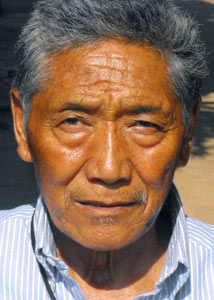Name: Pasang Tsering
(Alias: No)
Gender: Male
Interview Age: 66
Date of Birth: 1944
Birthplace: Dhopa - Porang, Utsang, Tibet
Year Left Tibet: 1960
Profession: Dairy Farming, Farming
Monk/Nun: No
Political Prisoner: No

Interview No.: 67M
Date: 2010-04-04
Language: Tibetan
Location: Doeguling Settlement, Mundgod, Karnataka, India
Categories: Culture and History
Keywords: childhood memories, Chinese -- first appearance of, customs/traditions, environment/wildlife, escape experiences, festivals, forced labor, shamans/mediums, taxes, Utsang
Summary:
Pasang Tsering's family engaged in farming as well as rearing animals. He talks about ri-lung tsatsik 'law of the environment' passed by the Tibetan government, which prohibited hunting of wild animals with the exception of rats and wolves. Domestic animals were killed for meat by a special caste of Tibetans and prayers were offered for the animals at the time of slaughter.
Pasang Tsering gives a glimpse of some of the festivals which were related to agriculture and he fondly remembers horse racing and target shooting. The important roles of the monks and ngagpa 'shamans' in the life of the community are outlined. He describes how religious idols prevented hailstorms from destroying crops and illnesses from infecting villagers. He also explains two different groups of taxpayers called chueshi and shungpa.
Pasang Tsering recalls when the Chinese first appearance in his village looking very poor and assisting the Tibetans. Later the army came in vehicles with propaganda films and a large photo of Mao Zedong. They imprisoned local leaders and forced them to do hard labor. Fearing that their eight sons would be recruited by the Chinese to fight the "Tibetan rebels," Pasang Tsering's family with made their escape.
Interview Team:
- Rebecca Novick (Interviewer)
- Ronny Novick (Videographer)
- Namgyal Tsering (Interpreter)

